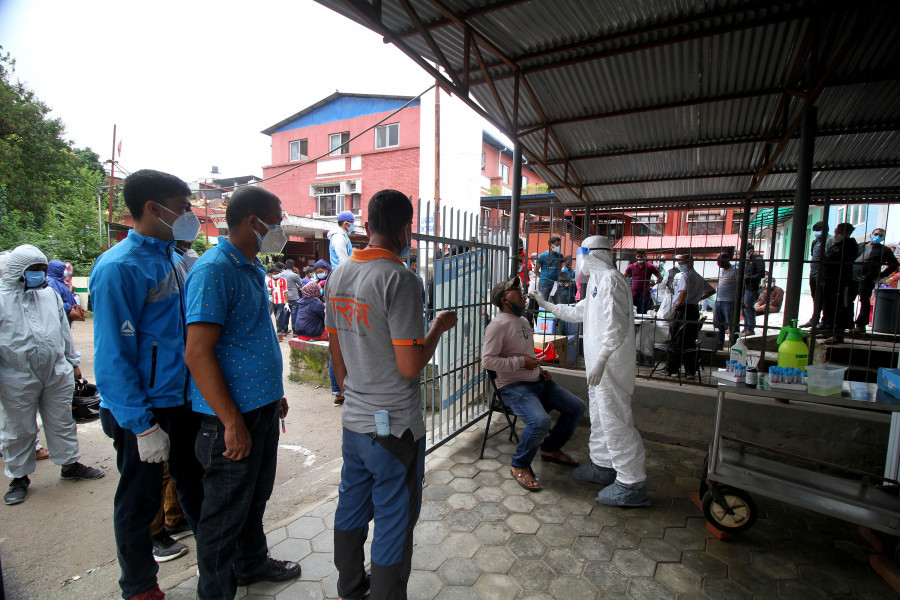Health
Active Covid-19 cases soar to 25,007 after country sees new spike in daily infections
Public health experts say the number of cases could be much higher, as many asymptomatic patients are yet to be tested, which further raises virus spread risk.
Arjun Poudel
Nepal on Wednesday recorded the highest number of new coronavirus cases for a single day, as the country logged 3,439 infections, pushing the national tally to 94,253. With 15 more deaths reported, the countrywide toll has reached 578. The new infections meant the country also clocked the government’s warning target of 25,000 active cases, a mark the Health Ministry had said would lead to yet another lockdown.
Dr Samir Kumar Adhikari, the joint spokesperson for the Health Ministry, said that his ministry had recommended a lockdown if the active cases crossed the 25,000 mark.
“But it is up to the Cabinet to decide,” Adhikari told the Post. “That was just our recommendation.”
As of Wednesday, the number of active coronavirus cases in the country stood at 25,007.
Public health experts say that the record surge in the new cases is alarming, but it was expected as the government, by and large, failed to take any serious measures to contain the spread of the virus and improve facilities to treat the infected.
“It is the nature of this coronavirus, which spreads like a wildfire,” Dr Kiran Pandey, a consultant physician at HAMS Hospital, told the Post. “Spikes in the new cases show that the virus has been spreading at a rapid pace and in an uncontrolled way.”
As of Wednesday, 33,771 people tested positive in Kathmandu Valley.
Hospitals in Kathmandu Valley have already run out of intensive care beds, and ventilators and doctors have warned that soon there won’t be enough health workers to attend to patients.
Public health experts estimate that the actual number of the infected people could be many times higher than what is being detected every day, as many infected people may not have been tested—either because they are not going for tests or because they have no symptoms or they lack the wherewithal to get tested.
Since Sukraraj Tropical and Infectious Disease Hospital conducts tests for free, it is always crowded with people having to wait for hours for their turn. Private health facilities and laboratories do tests for a fee, which not many can afford.
Asymptomatic but infected people, whose number is over 50 percent of the total cases, are even not seeking tests, according to Dr Sher Bahadur Pun, chief of the Clinical Research Unit at Sukraraj Tropical and Infectious Disease Hospital.
Doctors say those people can spread the virus to others.
“The new case detection rate and the total test numbers show we are doing 10 times less tests than required,” Pun told the Post. “It has become even more apparent now that the virus is spreading fast in society.”
The government, which has already given up on its fight against the pandemic, is now completely clueless.
Multiple officials at the Ministry of Health and Population the Post spoke to said that they could not say how and when the infection could be controlled and how many people will contract the disease and could die.
“How can I tell you about the exit strategy, when no scientist throughout the world has been able to give a definite answer to this problem,” said Dr Jageshwor Gautam, spokesperson for the Health Ministry.
Public health experts say an exit strategy is beyond the Nepal government’s capacity now, as it failed to pay heed to experts' advice and completely disregarded science. Even as the government formed its own mechanisms “to fight the pandemic”, they were full of ministers and bureaucrats, who lacked the understanding of, and expertise on, the disease.
Experts’ continued calls to expand testing, tracing and isolation were completely ignored by the authorities, who also refused to take fair criticism of the government’s poor handling of the pandemic.
“The government doesn't even have a phase-wise strategy to respond to the daily surge in cases,” Dr Govinda Ojha, former director-general at the Department of Health Services, told the Post. “We have reached a critical situation, as the virus is spreading in such a way that the authorities cannot control it now, as they have neither the physical infrastructure nor human resources required.”
As the government lost its fight against the virus, it came up with stricter guidelines for testing, just as it handed over the job of contact tracing entirely to the local governments, which too lack resources.
As per the new guidelines, government laboratories will conduct Covid-19 tests only on those people who either have symptoms or who provide proof that they had come in close contact with the infected people.
“Due to this, poor people have been deprived of the tests and as a result, also of medical care,” Dr Lhamo Yangchen Sherpa, an epidemiologist, told the Post.
Of the 14,209 tests performed in the last 24 hours, over 4,600 were conducted by private laboratories. Since not all can pay the fee and they have to wait in queues at government facilities if they want the tests for free, there are chances that they would remain untested and spread the virus.
Dr Bhagwan Koirala, chairman of Nepal Medical Council, said that the best way to minimise the spread of the infections is to follow science and learn from own experience—not to make the mistakes that the government has made—and emulate other countries which have been successful in containing the virus spread.
“It has been eight months since Nepal reported its first case; now we have to learn from our own experience as well. Officials should be ready to acknowledge their mistakes and correct them,” said Koirala.
“They should continue those steps that helped contain the virus and learn from other countries. The best thing is to believe in science and listen to experts.”




 13.12°C Kathmandu
13.12°C Kathmandu















